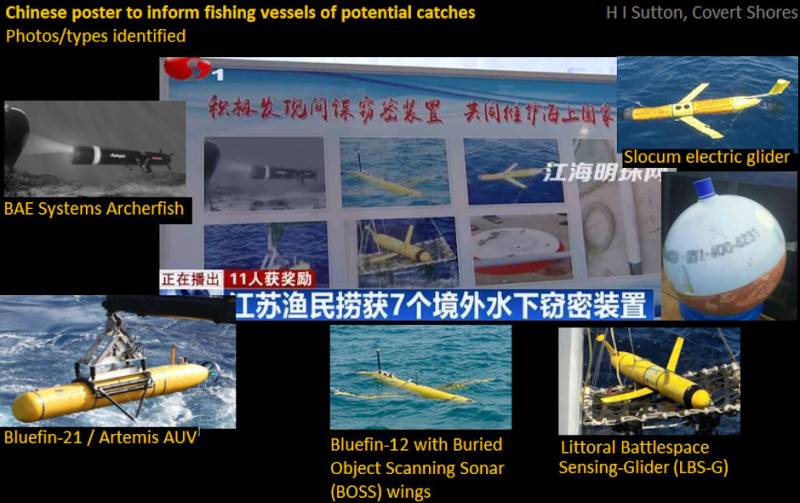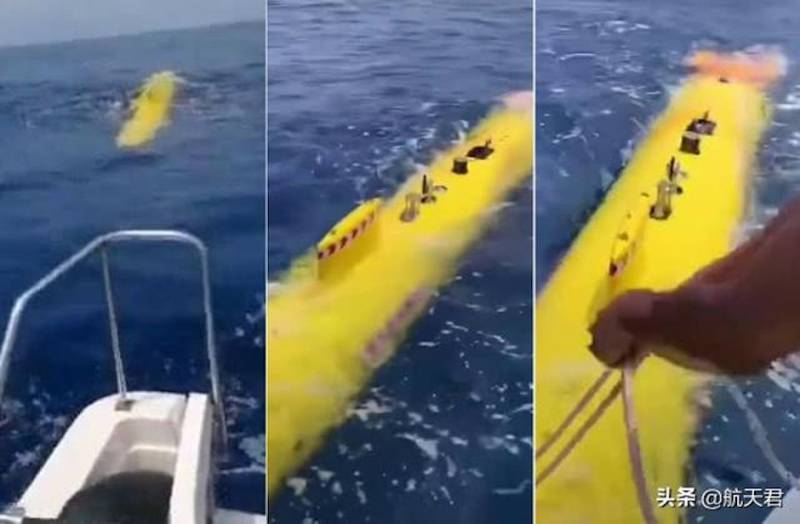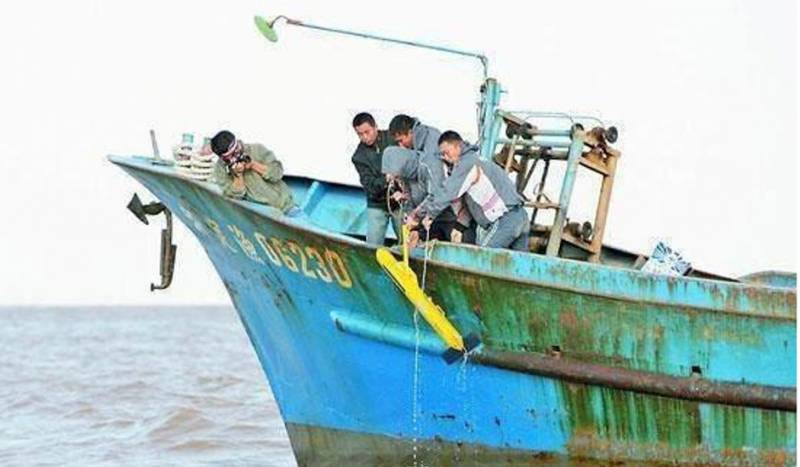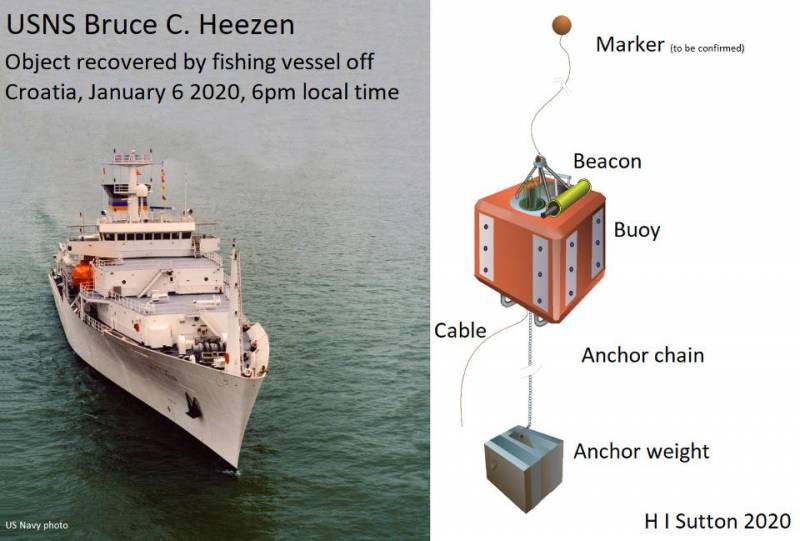Unknown devices and rewards for catching them: Chinese fishing
Since 2016, the PRC has been rewarding fishermen for catching and delivering “unfamiliar technical underwater devices” to government bodies.
"We will surrender more - they will give more!"
We can talk about both our own, lost PLA Navy, and foreign devices, and it doesn’t make a difference whether the fishermen caught them in their territorial waters, in the exclusive economic zone of the PRC, or beyond.
Such devices mean training or even combat torpedoes, training mines, sonar buoys anti-submarine aviation, stationary buoys of sonar systems for underwater surveillance, and, of course, underwater unmanned vehicles (BPA or, in English, UUV), both tethered and autonomous. The remuneration, it should be noted, is extremely substantial for any country, not only for China - the amount reaches 500 thousand yuan, which is approximately 72 thousand dollars. Of course, they won’t give so much for their buoy or their torpedo (although torpedoes, even training ones, cost extremely solid money), but they will pay the maximum for foreign ones, especially spy ones.
So, at the end of 2019 in Jiangsu province in the city of Nantong, 7 fishing fishers, including a woman, were awarded at an open conference for finding 11 devices. The year before there were 18 people who found 9 foreign devices. Everything is handed over at the local office of the Ministry of State Security of China, in a festive atmosphere and with press coverage. Why exactly in Jiangsu? The vast majority of finds happen there - this is a province with a large coastline, more than 1000 km of length, well developed economically (in GDP it is inferior only to Guangdong province), with developed fishing and located near an important crossroads of the sea routes - South Korea and DPRK, and Japan, south - the largest port and economic center of the PRC Shanghai, even south - hostile Taiwan. Yes, and the base and shipyard of the Chinese fleet nearby are available. Of course, the activity of foreign intelligence services in this region is very high - both the activities of the intelligence services of the USA, Japan and South Korea against the DPRK and China, and the activities of intelligence agencies, including the maritime special (special forces) of the DPRK against the USA, Japan and South Korea, and action intelligence China, of course.
"Non-fishing" catch stories
In China, state security agencies publish relevant announcements for fishermen and other citizens in the press - they say if you find such unfamiliar devices, call 12339 at the security call center or inform via the website. They are published in the media and in the Chinese segment of the Internet and posters with the image of BPA of foreign origin that can be found are hung up in ports. And this, as we see, is bearing fruit. Of course, they are found in different regions, but the press reports are far from everything. So, in 2012, in the Hainan region, a BPA of “foreign” (American in fact) origin was caught, made in dimensions close to the standard NATO 324-mm anti-submarine light torpedo. Although it was unlikely that he was released from the TA of a surface ship, judging by a number of details, he would not fit there in caliber, most likely, he was dropped from an airplane. The BPA had a titanium case, a satellite dish and a set of cameras.
It was not possible to identify it for sure (perhaps the Chinese special services were able to, but did not share their knowledge), outwardly it looked like one of the REMUS-600 BPA manufactured by the Kongsberg company of the Hydroid series, but a number of details indicate that it is completely another BPA. For some reason, this particular case became well known in China, and now in the news even the recent rewarding of fishermen is illustrated with old footage of finds in 2012. Another, presumably "Kongsberg" BPA REMUS-100, was found by fishermen from Jiangsu province in 2017, they caught a long time ago, apparently lost by the owners and heavily corroded.
The origin of the devices found is, of course, difficult to figure out. The main part of what they find belongs to the national Navy, and such devices, lost in their uniforms and stretched out by fishermen where they can be caught, may be prohibited (but fishermen from all countries are not too disciplined) are not advertised. Photos of foreign BPA are rarely found in the PRC mass media. But still fall. In particular, on the aforementioned poster for fishermen, it was possible to identify such BPA as Archerfish from BAE, Slocum and its military version Littoral Battlespace Sensing-Glider, Artemis AUV and Bluefin-12. It’s not a fact, of course, that all these devices fell into the hands of the Chinese special services - they could easily pull photos from the Internet.
However, it is known reliably about falling into the hands of the Chinese of this BPA - Littoral Battlespace Sensing-Glider (LBS-G), found at the end of 2016 by a Chinese vessel. LBS-G, created on the basis of the Teledine civilian Slocum, is a non-self-contained vehicle towed by an “underwater glider” capable of carrying various types of detection equipment, in particular, a multi-beam sonar for 3D mapping of the seabed and the search for sunken objects. The device belonged to the US Navy, and was engaged, according to the Americans, "peaceful oceanographic activities." The Chinese later, after protests from the United States, returned to them this BPA, and all this story became famous thanks to Trump and his twitter.
But the ship from which this device was released can be attributed to peaceful oceanographers exactly as much as the numerous "cruisers" of our GUGI like the well-known "Amber". This is the USNS Bowditch (T-AGS 62) built in 1994, the US Navy's oceanographer with a displacement of about 5 thousand tons. This typical reconnaissance ship practically constantly hangs in the waters near China and regularly gets there in history. In March 2001, a Chinese frigate, going a distance shorter than the cable, forced the ship to leave the "research" area near the state maritime borders of the DPRK and South Korea. But later they returned, accompanied by a warship of the United States Navy. In 2002, Chinese patrol ships drove him out of the area near the state border of China in the Yellow Sea, and in May 2003, Boudich was rammed by a Chinese fishing seiner (rumored to be the same seiner as an American peaceful explorer , the Chinese have enough of these ships), and received damage. Boudich was also noted near the Indian Nicobar Islands in 2001, which provoked protests from India. And even the allied South Koreans got his activity somehow so that they protested the United States.
The LBS-G was picked up by a Chinese navy support vessel, a rescue vessel to assist submarines. Perhaps the Chinese simply discovered the towed American vehicle by the active channel of the hydroacoustic complex, which is obliged to be on such a vessel, and cut off the cable to him with their BPA or somehow picked it up, in general, they honestly stole it. Perhaps it was the multi-beam mapping sonar that interested them. Or maybe they wanted to interrupt the search for the Americans, until they found something valuable. Towed vehicles and extended antennas of hydroacoustic stations have previously stolen, including our sailors.
Croatian catch
I must say that the Americans do not disdain and follow the allies. A Croatian fishing boat netted more than it expected when it pulled something from the Adriatic on January 6th. "Marian II" trawled at a depth of 140 m when he trapped a mysterious object. The device, weighing about 100 kg, was lifted to the deck. The crew and local media could only guess what it was. The device was a cubic orange buoy with an anchor device underneath.
The captain of the ship not only did not know his destination, but could not make out any signs indicating to whom he belongs. After posting photos of the object on social networks, he reportedly received a phone call from the owner with a request to return what he found. The owner was the US Navy. Horvath returned the device to the Americans, as they say, after some intense bargaining for remuneration and compensation for broken networks. The USNS Bruce C. Heezen, the "peaceful oceanographer" of the US Navy Bruce C. Heezen, installed the same device of the same type, "Boudic", found out by examining transponder readings on sites like marinetraffic.com. It is strange that the Americans did not turn off the transponder when they were installing some devices — ours usually do this, otherwise there is no sense in such works.
According to some indications, a well-known underwater researcher, HI Sutton, suggested that the buoy consisted of a Teledine acoustic transponder and an Kongsberg acoustic beacon. And the device itself came to Croatia, and then aboard the Bruce Hizen from Mississippi, from the city of Hancock, where the NASA John Stennis Space Center is located (where fire tests of engines for the ILV are carried out) and the facilities related to NAVOCEANO are located there - The US Navy’s Oceanographic Administration, in general, is something like our GUGI. What it was supposed to do there buoy off the coast of Croatia and who to monitor, it is difficult to say. Around there are only NATO allies, and our submarines and nuclear submarines are unlikely to be often in the Adriatic - it makes no sense. Maybe, of course, the truth was purely scientific research, or maybe not.
Experience that benefits many
Why do Chinese fishermen catch a lot of hostile BPA with their nets? Well, firstly, because the coastal fishing fleet of the PRC is very numerous, that is, there are statistics. Secondly, these devices are actively used against China, but, say, against Brazil - hardly. Thirdly, part of the Chinese fishermen, as already mentioned, the fishermen are the same as those from the GUGI ships - pure scientists. Fourth, it is the Chinese authorities and the media that are promoting this topic, while in Russia, for example, they are silent about it, although the navy and security agencies, of course, work on similar problems.
And perhaps we should have announced such rewards, of course, for finding only foreign UAVs, otherwise our lunatics first of all catch their equipment - install it back later. Because the interest of US and NATO intelligence in our waters is beyond doubt - what is the cost of one Nenoksa or training grounds in the Novaya Zemlya region, where such interesting things as the Onyx-M anti-ship missiles, Zircon, Caliber-M anti-ship missiles and SPA "Poseidon" and KR with YARD "Burevestnik". Of course, such areas are probably protected from such penetration, otherwise some people would not have had to build mushroom pickers not so long ago and use other ways to satisfy curiosity at the state expense. But there are other areas as well. Yes, in the field of underwater drones Russia is at least not lower than its competitors, and in a number of positions, of course, even higher than them - the same Harpsichord-2R-PM can be recalled, or topics such as Cephalopod, not to mention the same Poseidon "with the devices that ensure its activity. But it probably won't hurt to stimulate the vigilance of our fishermen and sailors. As well as to intensify the creation of means to combat such small UAVs, and not only small ones. So far, nothing but the same UAVs, but of a fighter nature, and mining, "sharpened" for the fight against small objects, does not come to mind. But for sure those who do it professionally have more ideas. And to you, dear readers, what ideas for combating such "overseas guests" come to mind?





Information